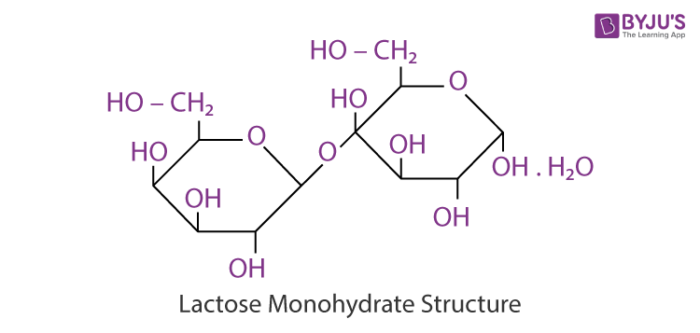What is Lactose?
Lactose is a disaccharide that contains units of galactose and glucose.
Lactose is a sugar present in the milk. One of the essential classes of biomolecules is carbohydrates. These biomolecules have a significant role in daily life by providing three requirements, i.e., food (starch), shelter (cellulose), and cloth (cellulose).
Carbohydrates belong to optically active compounds with hydroxyl and carbonyl functional groups and bearing the general formula Cx(H2O)y. These are also called saccharides and classified based on the product of hydrolysis.
Lactose Monohydrate
Lactose monohydrate is mainly present in milk and exists as a naturally occurring disaccharide. Lactose crystals contain water of crystallisation, because of which molecular mass becomes 360.3 g/mol compared to 342.3 g/mol of anhydrous lactose. It is slightly soluble in ethanol but quite soluble in water It is a white and odourless crystalline powder.
When lactose monohydrate is gently heated to 418 K temperature, it results in the removal of one molecule of water from lactose anhydrous.
Lactose Monohydrate Structure

Lactose Intolerance
- Lactose intolerance relates to a body that cannot digest lactose which is usually found in milk and dairy products.
- When lactose travels through the colon (large intestine) without being properly digested, it can create uncomfortable symptoms such as belly pain, bloat, and gas. The people with lactose intolerance cannot digest milk or dairy products.
- Lactose intolerance is found mostly in adults. A big challenge for the people who are lactose-intolerant should learn what to eat for avoiding discomfort and get enough calcium for healthy bones.
- The reason for lactose intolerance is when the small intestine does not make enough enzymes called lactose. The body requires lactose to break down or digest lactose.
- Some premature babies also have temporary lactose intolerance since they are not yet capable of producing lactose. After a baby starts to produce lactose, the condition goes away.
Symptoms of Lactose Intolerance
Symptoms of lactose intolerance depend on the amount of lactose your body can make. The symptoms of lactose intolerance include:
- Loose stools or diarrhoea
- Throwing up
- Gas
- Gurgling
- Pain or cramps
- Bloating
To know more about lactose and other important disaccharides, register with BYJU’S now!

Comments